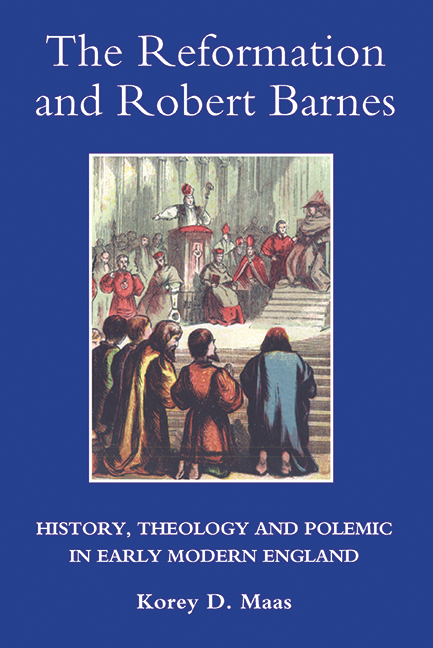Book contents
- Frontmatter
- Contents
- Dedication
- Acknowledgments
- Abbreviations and short titles
- Introduction
- Part I The Life and Theology of Robert Barnes
- Part II Barnes's Programme: History, Theology, and Polemic
- 3 History in Theology: Sentenciae and Supplications
- 4 Theology in History: Vitae Romanorum Pontificum (1536)
- 5 The Historical-Theological Programme of Robert Barnes
- Part III The Reception and Revision of Barnes's Programme
- Bibliography
- Index
- Miscellaneous Endmatter
4 - Theology in History: Vitae Romanorum Pontificum (1536)
from Part II - Barnes's Programme: History, Theology, and Polemic
Published online by Cambridge University Press: 11 May 2017
- Frontmatter
- Contents
- Dedication
- Acknowledgments
- Abbreviations and short titles
- Introduction
- Part I The Life and Theology of Robert Barnes
- Part II Barnes's Programme: History, Theology, and Polemic
- 3 History in Theology: Sentenciae and Supplications
- 4 Theology in History: Vitae Romanorum Pontificum (1536)
- 5 The Historical-Theological Programme of Robert Barnes
- Part III The Reception and Revision of Barnes's Programme
- Bibliography
- Index
- Miscellaneous Endmatter
Summary
As demonstrated in the previous chapter, a sustained use of historical sources and historical argument is evident in Robert Barnes's publications of the early 1530s. The conclusion thus proposed was that such historical argumentation was central to the polemical task Barnes had set for himself, even in those writings which appear distinctly theological in nature. It must be admitted, however, that this is not a widely held conclusion. Partially explaining this is the simple fact that most studies of Barnes have focused almost exclusively on his doctrinal conclusions, especially as they relate to the theology of Martin Luther. Not unsurprisingly, then, most studies have dwelt on Barnes's most explicitly doctrinal publications. But Barnes did not limit his output to the sort of locus by locus commentary on doctrine which is evident in his Sentenciae and Supplications. His final publication, the Vitae romanorum pontificum, offers readers something radically different; and here especially Barnes's historical leanings are unmistakable.
The Vitae romanorum pontificum, as its title suggests, is a compilation of and commentary on various acts from the reigns of past popes. Arranging the lives chronologically, Barnes offers short accounts of the pontificates of Roman bishops from the apostle Peter through Alexander III. This drastic change of genre, however, is not necessarily a signal that Barnes had set for himself a new or fundamentally different agenda. In fact, despite differences of appearance, the Vitae is best viewed as a continuation of the programme begun even with his 1530 Sentenciae. Some small hint of this is evident already in its opening pages; Barnes very nearly begins the body of his last work where his first concluded, with commentary on the post-apostolic development of the Mass. It was also in an earlier work, his Supplicacion of 1534, that Barnes first announced his intention to take up the historical issue which occupies him in the Vitae. While attacking the bishops of England for swearing allegiance to that of Rome, he paused to announce, ‘howe this caterpyller is come to be a lorde … I wylle speake (God wyllynge) after this in a peculier treatyse’.
- Type
- Chapter
- Information
- The Reformation and Robert BarnesHistory, Theology and Polemic in Early Modern England, pp. 107 - 136Publisher: Boydell & BrewerPrint publication year: 2010

